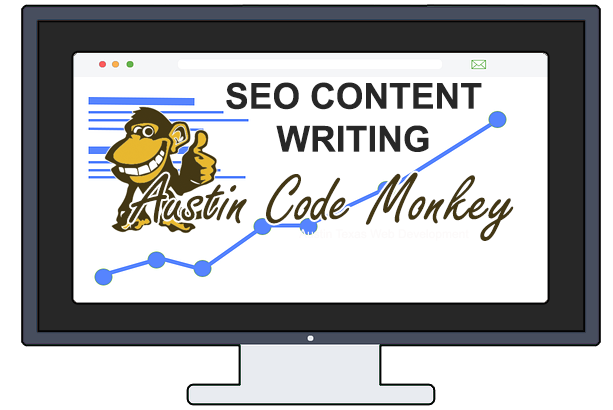SEO Content Writing For Austin Business
Introduction
Search engine optimization (SEO) copywriting is the art of writing content on your website that will get your site ranked higher in search engines. There are several factors that go into getting your site ranked higher, such as keyword density, length of pages, and how fresh the content is. Your site needs to have a mixture of long-form content and shorter posts. The most important part of any SEO content is the title tag. This is the text that will show up in the search engine results and underlined links on other websites that aren’t yours. This should match what is in most paragraphs on the page (further down).

Search engine optimization (SEO) copywriting is the art of writing content on your website that will get your site ranked higher in search engines.
Search engine optimization (SEO) copywriting is the art of writing content on your website that will get your site ranked higher in search engines.
In order to rank well, you must have quality content that answers people’s questions, provides useful information, and encourages them to stay on the page longer. This means using keywords appropriately and not stuffing them into your copy just for the sake of getting more traffic from Google or other search engines.
There are several factors that go into getting your site ranked higher, such as keyword density, length of pages, and how fresh the content is.
There are several factors that go into getting your site ranked higher, such as keyword density, length of pages, and how fresh the content is.
Here are some tips for creating great articles:
- Keyword density should be around 2-4% (i.e., 2-4 keywords per 1,000 words). This means if you write a 300-word article, you should have at least three or four different keywords in it. The more unique keywords you use in each article, the more likely it is that Google will show them when someone searches for them on the Google search engine!
- The length of your articles should also be around 300-500 words as well – this makes sense because longer pages take longer for Google’s algorithms to index so they don’t appear near as often as shorter ones do during searches conducted by visitors looking for information about Austin businesses services company looking specifically for SEO content writers who can create quality written materials with relevant keyphrases provided by clients themselves.”
Your site needs to have a mixture of long-form content and shorter posts.
As the owner of an Austin business, you know that it’s important to have a website. And as the owner of an Austin business, you also know that you want people to visit your site so they can learn about your products or services. This is where SEO content writing comes in: by creating engaging, readable articles and blog posts on a regular basis, we can help increase traffic to your site from search engines like Google.
However! Before we get started writing our first piece of long-form content (which will probably be an article), let’s talk about why this type of content is so important for SEO purposes–and what makes it different from other types of online writing.
The most important part of any SEO content is the title tag. This is the text that will show up in the search engine results and underlined links on other websites that aren’t yours.
The title tag is the most important part of any SEO content. This is the text that will show up in the search engine results and underlined links on other websites that aren’t yours.
It should be a few words long (no more than 70 characters) and include keywords related to your subject matter, but don’t go overboard with it–keep things simple, folks! There are some exceptions when it comes to long-form blog posts or articles that provide detailed information on a particular topic or service offered by your company, but for now, let’s focus on those short bits of text that get read at lightning speed while someone’s scrolling through Google at work trying not to get fired again today because they spent too much time looking up “how do I quit my job without getting sued?”
The subheading should be 1-2 sentences long, no more than 160 characters wide, and also include keywords related to your subject matter.. This should match what is in most paragraphs on the page (further down).
The subheading should be 1-2 sentences long, no more than 160 characters wide and also include keywords related to your subject matter.. This should match what is in most paragraphs on the page (further down).
If you’re writing about SEO for Austin businesses, then it’s important that you use words like “SEO” and “Austin” throughout your content. You want people who are searching for this information to find it easily!
Make sure you use keywords in your first paragraph but don’t overdo it! Use them naturally within sentences and put a few at the beginning if you must.
- Make sure you use keywords in your first paragraph but don’t overdo it! Use them naturally within sentences and put a few at the beginning if you must.
- Don’t forget about your audience. Think about what questions they may have about your product or service and address those issues early on. This will help improve their understanding of what you do and how it can benefit them, which will make them more likely to buy from you later down the line.
Keep paragraphs short — 2-3 sentences max! But remember, each paragraph should have its own topic sentence or statement about what’s being discussed. Each paragraph should have 3-4 sentences in total.
Keep paragraphs short — 2-3 sentences max! But remember, each paragraph should have its own topic sentence or statement about what’s being discussed. Each paragraph should have 3-4 sentences in total.
Paragraphs are the basic unit of content on the page, so they should be easy to read and understand by themselves. If you can’t understand what you’re reading within 2-3 seconds, then it’s probably too complicated for your audience.
Conclusion
Austin, Texas is a vibrant and growing city that is home to many businesses of all sizes and industries. As a business owner in Austin, it’s important to understand the importance of SEO (search engine optimization) and how it can help your business thrive.
SEO is the process of optimizing your website and online content to rank higher in search engine results pages (SERPs). This is important because the higher your website ranks, the more visibility and traffic it will receive. When it comes to SEO, content is king. Having high-quality, relevant content on your website can help improve your search engine rankings and drive more traffic to your site.
As a business in Austin, there are a few things to keep in mind when it comes to SEO content writing. First, it’s important to understand your target audience and what they are searching for. This can help you tailor your content to their specific needs and interests.
Next, it’s important to use relevant keywords throughout your content. This can help search engines understand what your website is about and help it rank higher in search results. However, it’s important to use keywords naturally and not stuff your content with too many keywords.
Another important aspect of SEO content writing is to use meta tags, such as title tags and meta descriptions. These tags provide information about your website to search engines and can help improve your search engine rankings.
Finally, it’s important to regularly update your website with fresh, relevant content. This can help keep your website relevant and attract more visitors.
In conclusion, SEO content writing from Austin Code Monkey is an essential aspect of any business in Austin, Texas. By understanding your target audience, using relevant keywords, and regularly updating your website with fresh content, Austin Code Monkey can improve your search engine rankings and drive more traffic to your site. With the help of SEO, your business can grow and thrive in the vibrant city of Austin, Texas.
